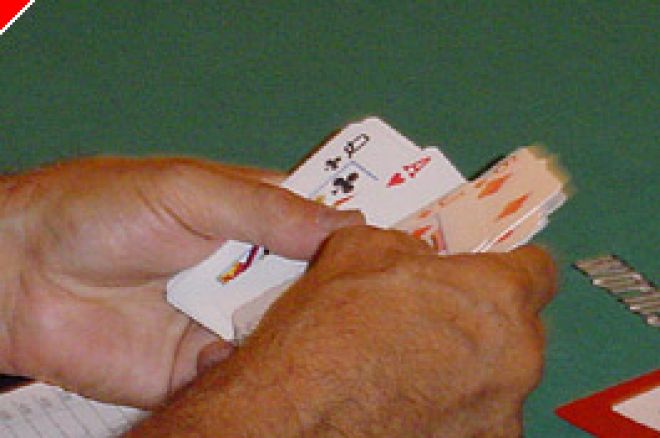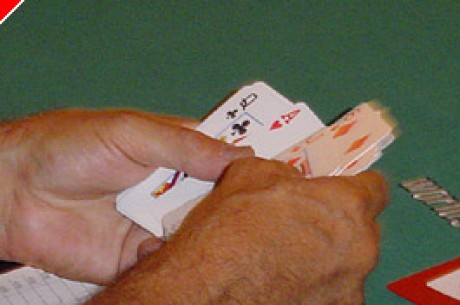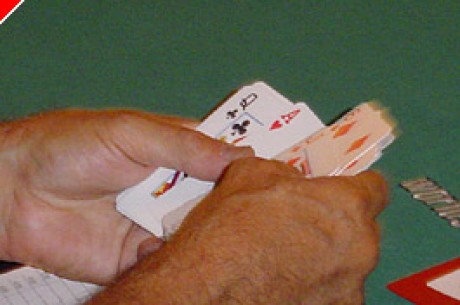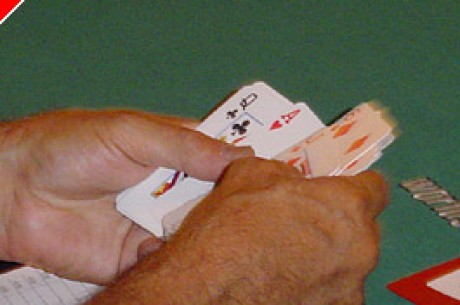Stud Poker Strategy: Big Pot Stud

I spend most of my stud-playing hours at Foxwoods Resort Casino in Ledyard, Connecticut. From time to time, however, I like to travel for my poker action. Unfortunately, there are few places in the world where decent 7-card stud is spread. One of those places is Caesar's, Indiana – a beautiful riverboat casino across the Ohio River from Louisville, Kentucky in Elizabeth, Indiana. They have a great $30/60 stud game that runs on Saturday and Sunday.
I found myself there for Kentucky Derby weekend. When I booked the trip I imagined that the poker room, and the stud game in specific, would be filled with money-crazed gamblers, $100 bills popping out of their pockets, eager to gamble it up. I saw myself playing a tightly controlled game, being patient, and leaving thousands of dollars to the good.
Ah, if fantasy were reality I would now be a very rich man.
The game did not go exactly as I had planned. It was a good game, to be sure. There was at least one player who bordered on being a maniac. Not that he raised every pot, or even most pots. But he was surely a "live one." He was joined by one other complete calling station and a couple of selectively aggressive players. It was the type of good game, with enormous pots, that I always look forward to.
Even so, I was a huge loser in the game; for the six or so hours that I was able to play I lost about 30 big bets. To make matters worse, one of the regular players in the game, who knew that I was a writer, kiddingly rubbed some salt on my poker wounds with a parting quip. "So, Ashley," he asked with a wry smile, "do your publishers pick up your losses at the table?" "No Karl," I answered, "though it's a good thing I do write about these experiences — or I'd be broke tonight."
What happened? How did I lose so much? Some of it has to do with the nature of large-pot stud.
Let me give you a taste of what I'm talking about when I refer to "large-pot stud." The ante was $5 per player with a $10 bring-in. Typically, hands were competed three- or four-way until fifth street. Someone would typically raise on third, and three or four people would call. There would often be a re-raiser. This would thin the field, but usually to no fewer than three players. Sure, there were hands when everyone conceded to the third-street raiser. And sometimes, of course, pots would be played heads up. But more than half the time hands were played multi-way until at least fifth street. This meant that the pot would be $300 or more by the time betting action commenced on fifth street.
This, in turn, encouraged loose and aggressive play. With the pot at five times a large bet or more, the typical computations that a stud player makes on fifth were skewed. In the more typical stud game, with the hand being competed heads up, the pot would be half that size. A good player must adjust.
The adjustments I made were to become looser and more aggressive than I normally would be. There was a huge advantage to narrowing the field with a large pot –- even with a hand that was second best. Similarly, my drawing hands were getting more equity. So I was more inclined to play them –- even with a double bet. If I hit I'd win enough money to justify my looser play.
Here's an example. I had three cards to a flush on third street: (A♦ 4♦) 10♦ – headed by an Ace. The bring-in was two to my right. He brought it in for $10. A Jack raised. There were five players including a King and a Queen left to act after me. There was one diamond and one of the fours exposed, but other than that my hand was completely live. Under most circumstances I'd call the completed bet. But I'd hesitate if I thought that the pot would be raised if I called. In this rocking and rolling game I was a little concerned with a re-raise. But given the eventual size of the pots in this game, I decided that even if there were a reraise, a call made sense.
I entered the pot for a completed bet, only to have the pot raised again by the King. The Queen and the Jack called. With four-way action and live diamonds and a live Ace I called. The pot was $290.00.
On fourth street I didn't improve – getting some unsuited middling card. No Aces were exposed. The King, on my left, bet. The Queen called and the Jack called. In a typical, somewhat tightly structured game, with a heads-up contest at this point, I'd almost surely fold in this spot. But given the nature of this game, I did not have to think about this decision. With four-way action and my diamonds and Ace still very live I called as well –- looking for a pair of Aces or a flush draw on fifth. The pot was $410.00.
On fifth street I hit an Ace. A diamond fell elsewhere. The Jack paired his fourth street card –- a six. He bet. He was the very wild, loose and aggressive player in the game –- the live one I mentioned earlier. I had seen him expose his hand on the river quite a few times, showing nothing. He would frequently bet or raise with nothing but a scary board –- and sometimes not even with that. If the game had been heads up I might well have just called his bet, letting him continue to lead until the river. But here, with two players after me and with an enormous pot to compete for, there was no question but that my proper move was a raise. I might well have been in the lead, and, even more important, I wanted to knock others out of the pot if I could. Some players will almost automatically continue to call a single bet but fold quickly to a raised pot. So I raised.
Unfortunately, my opponents were smart enough to understand that they too were getting great pot odds – even if they read me for a pair of Aces. They called behind me. And the initial bettor called as well. The pot was $890.00.
On sixth street I caught another diamond. The player with a King paired an up card –- a five –- not his door card. The player to my right, with a Jack and a pair of sixes, was still high. But he was cowed, slightly, by my aggression on fifth. He checked to me. I bet, again hoping that others would fold. One player did –- the player with the Queen and with no pair showing. The third player, with a King, who had just paired his five, raised. This was fine with me. I imagined that he was hoping that the combination of my bet and his raise would be enough to knock out the player with the Jack who had bet initially on fifth street.
No such luck. He called the double bet. I figured that I was up against at least one player who had two pair. I also concluded that a re-raise by me wouldn't knock anyone out. I was almost surely second best or third best with my lone pair of Aces. I was probably against Kings up to my left and Jacks up to my right. But the pot was now a staggering $1190. I was getting nearly 20:1 for my $60 call. I could hit a flush, Aces up, or trip Aces. And there was the very long shot possibility that my Aces were good. So I called along as well. The pot was $1250.
On the river I caught a second pair for Aces up. The player to my left, with an exposed pair of fives, checked. The next player, with his exposed pair of sixes, also checked. I bet. They both called my bet. The player on my left had Kings up. The player on my right had... trip sixes. I lost about $400 in the hand.
The evening didn't get much better. I hit a few hands for some large pots. But much more frequently, I was on the losing end of such contests. I frequently found myself in the situation of having to play aggressively and loosely when I wasn't in the lead –- as in the above example. I was making the right plays, I thought, but didn't get the cards when they mattered.
There was a temptation to change my basic approach to the game because of my results –- tightening up and playing less aggressively in general. This is a natural response to losing –- especially when the stakes are larger than normal. But it didn't make sense here. The game wasn't changing. So if I deemed my strategy to be correct -– if being more aggressive and less conservative than in a typical $10/20 or $20/40 game was correct –- then changing it because my wallet was getting thinner would be incorrect.
After six hours I was done. I needed to leave for non-game related reasons –- and I found that my concentration was starting to go as well. I had enjoyed my session, but my bankroll was lighter for my efforts. And so I left. But not before another wag in the game called out to me, "Hey man, come back any time. And make sure you write a nice little article about THIS session!" And so I have.








